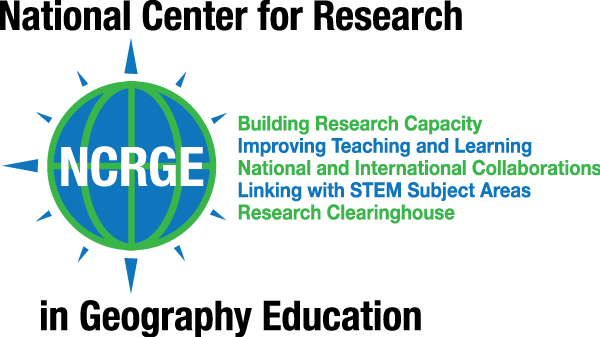NCRGE research sessions at the 2022 AAG Virtual Annual Meeting
The National Center for Research in Geography Education has organized the following geography education research sessions for the 2022 AAG Virtual Annual Meeting. Please join us!
Friday, February 25
This session will discuss the latest developments in Powerful Geography. Powerful Geography makes teaching and learning geography relevant for teachers and students. It is of benefit to society and creates students who are geographically informed to tackle issues in their lives and future jobs/careers.
Time: 11:20 AM – 12:40 PM (Eastern)
Geography Achievement and Future Geographers
This paper will be presented in the session “Geographic Education and Knowledge Creation Practices and Critiques”
Time: 3:40 – 5:00 PM (Eastern)
Abstract: Variability in geography achievement across the country is primarily attributable to the differential performance of student groups within schools. Achievement gaps are commonly viewed as indicators of social systems and structures that perpetuate disparities in educational opportunity and outcomes. In this paper, we argue that achievement gaps themselves act as barriers to equity by creating subpopulations of students with varying levels of geography knowledge necessary for productive work and effective citizenship. This knowledge inequality complicates efforts to broaden participation in geography education and geography careers.
Using data available from the National Assessment of Educational Progress (NAEP), we examine what 8th grade students are likely to know and be able to do in geography. Disaggregation of the data was performed to compare the outcomes of subgroups with persistently lower levels of geography achievement (e.g., Black and Hispanic, compared with White; female, compared with male; ELL, compared with not ELL; IEP, compared with not IEP; free/reduced-price lunch eligible, compared with ineligible; above modal age, compared with not above modal age). We then discuss the extent these groups of students are on track toward acquiring geography knowledge and skills recommended for different occupations. We conclude with recommendations for future research and interventions to foster educational equity in geography.
With funding support from the National Science Foundation’s Computer Science for All (CSforALL) program, the panelists in this session established a research-practice partnership (RPP) based in California with the goal to test approaches to curriculum design and educational pathway development toward a more inclusive curriculum for geo-computational thinking in schools and college programs. RPPs are “long-term, mutualistic collaborations between practitioners and researchers that are intentionally organized to investigate problems of practice and solutions for improving district outcomes” (Coburn, Penuel, and Geil 2013).
If successful, the long-term impacts of this RPP in developing these educational pathways would be to bridge the gap between in geography awareness and knowledge between K-12 and college, as well as bridging the diversity gap in U.S. geography programs.
Time: 5:20 – 6:40 PM (Eastern)
Sunday, February 27
AP Human Geography: 20 Years of Data
This session will discuss the results of a commissioned study of the Advanced Placement Human Geography (APHG) data over the last 20 years. The group of researchers analyzed the score distributions by geographic setting (state by state as well as by urban, suburban, rural school districts), student demographics, and grade level, and how this has changed over the entire history of APHG. For comparison, the team will also report similar student outcome data for cognate courses in the AP program.
Time: 2:00 – 3:20 PM (Eastern)

Leave a Reply